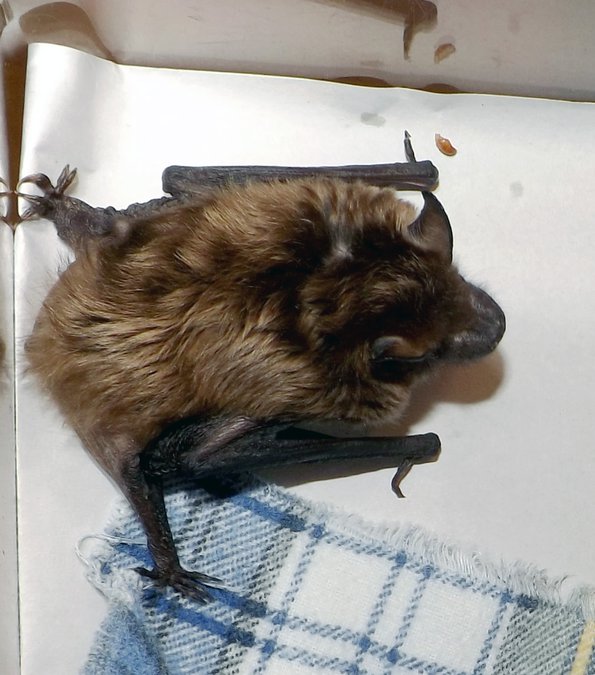The expressions ranged from “ah, cute” to “ugh, that’s close enough!” Wednesday when Mandy Kern showed a big brown bat to members of the Great Bend Noon Kiwanis Club.
Kern joined the Kansas Wetlands Education Center’s staff in June as the program specialist and was the club’s guest speaker Wednesday.
The bat was actually rather small, but the species known as “big brown bat” is considered large for an American bat. This bat, a male, was in a see-through carrier and made clicking noises as it sought out mealworms placed near it to demonstrate how bats use echolocation to “see” prey.
Because of injury, this particular bat is unable to fly, which is how it became a resident of the Kansas Wetlands Education Center, located northwest of Great Bend on K-156.
Kiwanis members wanted to know whether bats carry rabies.
“No more than any other mammal,” Kern said. Bats are mammals — the only mammal with true flying ability (as opposed to those that glide, such as flying squirrels and sugar gliders). They are susceptible to rabies but a bat that has the disease won’t live long.
On the other hand, bats are beneficial to humans because they eat insects. One bat can eat up to 1,000 mosquitoes in a night, she said.
Before coming to the KWEC, Kern lived in Olpe in Lyon County and taught high school science and agriculture education. The move to central Kansas brought her closer to family and also closer to a bit of Kansas history. “The Santa Fe Trail is in our backyard,” she said.


More wetlands news
Kansas Wetlands Education Center is managed by Fort Hays State University in cooperation with the Kansas Department of Wildlife Parks & Tourism. It opened in 2009 and will celebrate its 10-year anniversary next April during the Wings and Wetlands Weekend. From April 1 through Oct. 31 it is open from 9 a.m. to 5 p.m. Monday through Saturday and 1-5 p.m. Sunday. Admission to the center and its events is free.
“We’ve got events coming up throughout the year,” Kern said. This Saturday is the Butterfly Festival, with activities from 9 a.m. to noon.
Next Wednesday, approximately 400 second-graders from throughout Barton County will spend a day at the center.
The center overlooks Cheyenne Bottoms, the largest inland marsh in the United States, making it a prime location for birdwatchers. Shorebirds were abundant this summer and one recent bird sighted was a parasitic jaeger, a seabird that is rare for this area. Kern said it has since moved on and after recent rains the waterfowl have started coming in.
“We’re in fall migration,” Kern said. “It will be interesting to see how hurricanes change the migration pattern.”
Fall bird migration will continue to the end of October or early November. Sometime this fall, often in October, the wetlands are usually visited by whooping cranes, an endangered species.
Dove season opened Sept. 1 and teal season followed on Sept. 8, when more than 300 hunters checked in at the KWEC.
On Oct. 5 the FHSU Astronomy Club will bring telescopes for a night of stargazing.
There will be an Oct. 13 Hunter Appreciation Day and free breakfast.
Kiwanis events
Kiwanis President Barb Esfeld noted several upcoming events for the club, which meets at noon every Wednesday at the Walnut Bowl.
Next week’s guest speaker will be Great Bend City Administration Kendal Francis.
The club’s annual costume exchange will take place on Oct. 20 from 11 a.m. to 2 p.m. at the Great Bend Public Library. Children can come in and pick up a free costume. The club purchased several costumes and props after Halloween last year, Esfeld said.
“We can always use more. If you’d like to donate, you can drop it off at the library.”







